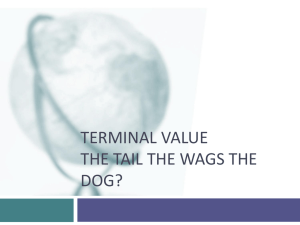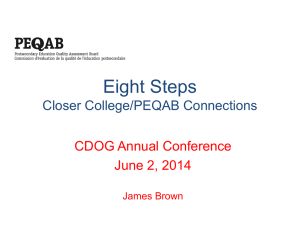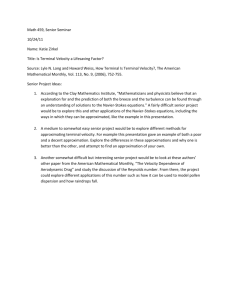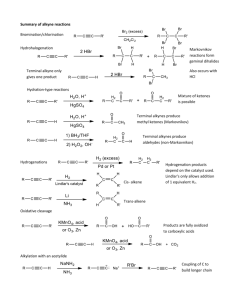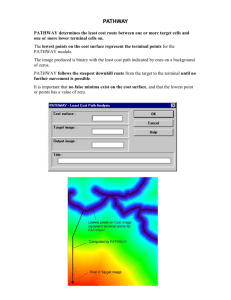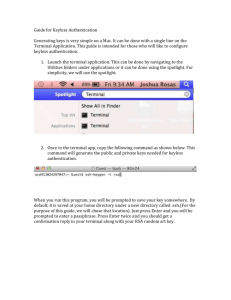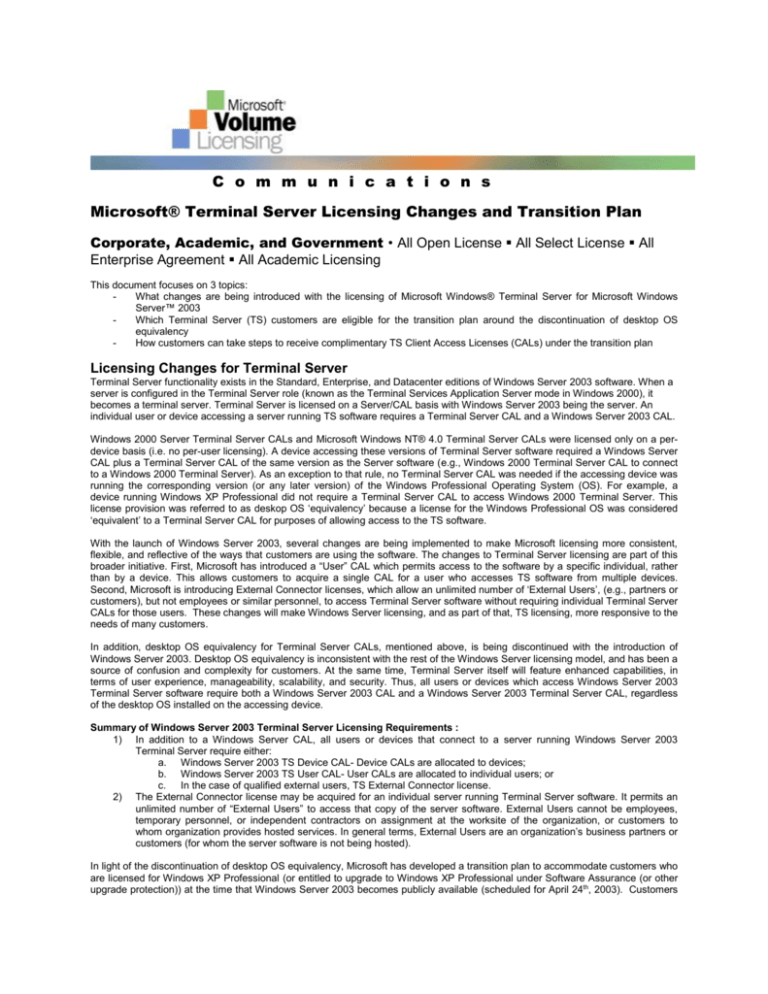
C o m m u n i c a t i o n s
Microsoft® Terminal Server Licensing Changes and Transition Plan
Corporate, Academic, and Government • All Open License All Select License All
Enterprise Agreement All Academic Licensing
This document focuses on 3 topics:
What changes are being introduced with the licensing of Microsoft Windows® Terminal Server for Microsoft Windows
Server™ 2003
Which Terminal Server (TS) customers are eligible for the transition plan around the discontinuation of desktop OS
equivalency
How customers can take steps to receive complimentary TS Client Access Licenses (CALs) under the transition plan
Licensing Changes for Terminal Server
Terminal Server functionality exists in the Standard, Enterprise, and Datacenter editions of Windows Server 2003 software. When a
server is configured in the Terminal Server role (known as the Terminal Services Application Server mode in Windows 2000), it
becomes a terminal server. Terminal Server is licensed on a Server/CAL basis with Windows Server 2003 being the server. An
individual user or device accessing a server running TS software requires a Terminal Server CAL and a Windows Server 2003 CAL.
Windows 2000 Server Terminal Server CALs and Microsoft Windows NT® 4.0 Terminal Server CALs were licensed only on a perdevice basis (i.e. no per-user licensing). A device accessing these versions of Terminal Server software required a Windows Server
CAL plus a Terminal Server CAL of the same version as the Server software (e.g., Windows 2000 Terminal Server CAL to connect
to a Windows 2000 Terminal Server). As an exception to that rule, no Terminal Server CAL was needed if the accessing device was
running the corresponding version (or any later version) of the Windows Professional Operating System (OS). For example, a
device running Windows XP Professional did not require a Terminal Server CAL to access Windows 2000 Terminal Server. This
license provision was referred to as deskop OS ‘equivalency’ because a license for the Windows Professional OS was considered
‘equivalent’ to a Terminal Server CAL for purposes of allowing access to the TS software.
With the launch of Windows Server 2003, several changes are being implemented to make Microsoft licensing more consistent,
flexible, and reflective of the ways that customers are using the software. The changes to Terminal Server licensing are part of this
broader initiative. First, Microsoft has introduced a “User” CAL which permits access to the software by a specific individual, rather
than by a device. This allows customers to acquire a single CAL for a user who accesses TS software from multiple devices.
Second, Microsoft is introducing External Connector licenses, which allow an unlimited number of ‘External Users’, (e.g., partners or
customers), but not employees or similar personnel, to access Terminal Server software without requiring individual Terminal Server
CALs for those users. These changes will make Windows Server licensing, and as part of that, TS licensing, more responsive to the
needs of many customers.
In addition, desktop OS equivalency for Terminal Server CALs, mentioned above, is being discontinued with the introduction of
Windows Server 2003. Desktop OS equivalency is inconsistent with the rest of the Windows Server licensing model, and has been a
source of confusion and complexity for customers. At the same time, Terminal Server itself will feature enhanced capabilities, in
terms of user experience, manageability, scalability, and security. Thus, all users or devices which access Windows Server 2003
Terminal Server software require both a Windows Server 2003 CAL and a Windows Server 2003 Terminal Server CAL, regardless
of the desktop OS installed on the accessing device.
Summary of Windows Server 2003 Terminal Server Licensing Requirements :
1) In addition to a Windows Server CAL, all users or devices that connect to a server running Windows Server 2003
Terminal Server require either:
a. Windows Server 2003 TS Device CAL- Device CALs are allocated to devices;
b. Windows Server 2003 TS User CAL- User CALs are allocated to individual users; or
c. In the case of qualified external users, TS External Connector license.
2) The External Connector license may be acquired for an individual server running Terminal Server software. It permits an
unlimited number of “External Users” to access that copy of the server software. External Users cannot be employees,
temporary personnel, or independent contractors on assignment at the worksite of the organization, or customers to
whom organization provides hosted services. In general terms, External Users are an organization’s business partners or
customers (for whom the server software is not being hosted).
In light of the discontinuation of desktop OS equivalency, Microsoft has developed a transition plan to accommodate customers who
are licensed for Windows XP Professional (or entitled to upgrade to Windows XP Professional under Software Assurance (or other
upgrade protection)) at the time that Windows Server 2003 becomes publicly available (scheduled for April 24th, 2003). Customers
who have acquired Windows XP Professional licenses (or active upgrade protection coverage (including Campus and School
Agreements) for Windows Professional), prior to April 24, 2003 (i.e. the Windows Server 2003 launch date) will be granted
complimentary Windows Server 2003 Terminal Server CALs.
Customer Eligibility for Transition Plan
To be eligible for the complimentary Terminal Server CAL, customers must meet one of the following criteria:
Acquired Windows XP Professional license before April 24, 2003 (date of Windows Server 2003 launch)
Have active Software Assurance or Upgrade Advantage coverage, or an active Enterprise enrollment, School Agreement
or Campus Agreement before April 24th 2003 covering their Windows desktop operating system
Any such customers with upgrade protection coverage for Windows Professional will be deemed to have upgrade protection
coverage for the complimentary Terminal Server CALs they receive. Customers with Windows XP Professional licenses without
upgrade protection coverage will receive complimentary Terminal Server CALs without upgrade coverage protection. All other
customers will need to acquire Terminal Server CALs for Windows Server 2003 via regular channels and prices. This includes
customers with older versions of Windows desktop OS (e.g. Windows 2000), as well as those who acquire licenses for Windows XP
Professional on or after April 24, 2003.
Process for Participation in Transition Plan
The process by which eligible customers obtain tokens for their complimentary Terminal Server CALs varies depending on how they
acquired their corresponding Windows XP Professional licenses. Below are 2 scenarios:
Scenario 1: Windows XP Professional licenses acquired through volume licensing – Using the “Install Licenses” function of the
Terminal Server Licensing administration tool, a customer needs to provide volume licensing program information (i.e. Enrollment
number, Agreement number, or License and Authorization numbers, depending on program type) along with a requested number
and type of Terminal Server CAL tokens. The information entered into the Terminal Server Licensing administration tool will be
validated by the Microsoft Clearinghouse, and assuming that request for tokens falls within the boundaries of the entitlement, license
tokens will be installed onto the Terminal Server License Server..
Scenario 2: Windows XP Professional licenses acquired through Retail or OEM channels – Customers who acquired Windows XP
Professional licenses in these channels will have received a product key with their software. After April 24th, 2003, they will be able
to go to a Web site specially created for this purpose, https://activate.one.microsoft.com, and input the product key using the “Install
Client Access License tokens” option. The Web site will validate eligibility. Once validation occurs, the Web site will return to the
customer a license key pack that should be entered into the Terminal Server Licensing administration tool.
For more detail on how either of these 2 scenarios works, please see an upcoming technical white paper, which will be available
after April 24, 2003. It will appear on the Microsoft Web site at
http://www.microsoft.com/windowsserver2003/technologies/terminalservices/default.mspx under the title, “Microsoft Windows Server
2003 Terminal Server Licensing: Licensing Technology White Paper”.
Ability to acquire Software Assurance on complimentary Terminal Server CALs: If customers would like to acquire Software
Assurance (SA) for Terminal Server CALs received as part of this transition plan, that option will be available through December 31,
2003. Normally, Microsoft requires customers to purchase SA at the time of license acquisition.. In this case of the transition plan,
customers will have until the end of the 2003 calendar year, to acquire Software Assurance for their Terminal Server CALs.
Customers enroll the complimentary licenses in SA by acquiring the “Windows Server 2003 Terminal Server CAL - Transition” SKU.
This will be available from June 1-December 31, 2003. The License component of the L&SA SKU is not a second license in addition
to the complimentary TS CAL customers receive; it is representative of that license.
FAQs
QUESTION: Why is the OS equivalency provision between Windows desktop OS and Terminal Server CALs being
removed? Why won’t future versions of Windows desktop give me rights for a complimentary Terminal Server CAL?
ANSWER: Two main reasons: a) increased value of Terminal Server CALs intrinsically, and b) desire for consistency with
Microsoft’s new licensing framework.
Increased value. It is important to note that Microsoft has added new functionality to Microsoft Terminal Server in the Microsoft
Windows Server 2003 release. This release of Microsoft Terminal Server software will provide more value than previous releases
and the additional functionality will provide customers with a better out-of-the-box solution. The following is a summary of some
improvements that customers will get with Terminal Server CALs.
Better User Experience
o
Advanced Resource Redirection: (Disk drives, Local and Network Printers, Serial devices, Smart card,
Clipboard, Time zone, Audio output, Windows key combos,)
o
Hi Color (Up to 24-bit), 1600x1200
Enhanced Manageability
o
WMI, Group Policy, ADSI, MMC Snap-In, Software Restriction Policy
o
Microsoft Windows System Resource Manager (WSRM)- Included in Microsoft Windows Server 2003,
Enterprise Edition
-2-
Increased Scalability
o
Scale-up: improvements to scalability in larger SMP systems.
o
Scale-out: support for Load Balancing (Session Directory)
Enhanced Security
o
128-bit bi-directional RC4 encryption
o
FIPS (Federal Information Processing Standard) Encryption Level
o
Smart Card Support
Consistency with Microsoft's new software licensing framework: As mentioned above, the change to Terminal Server licensing is
consistent with broader efforts to improve the licensing of Windows Server 2003.
We received feedback from customers that the licensing of Terminal Server was highly confusing, largely due to the OS
Equivalency provision. Because Microsoft Windows CALs and Microsoft Windows Server Terminal Server CALs are both
required when using Microsoft Windows Terminal Server, having the same license structure removes a layer of
complexity.
Microsoft Windows Terminal Server is adding the User CAL and External Connector options to solve many customer
problems encountered with our previous Microsoft Windows Terminal Server licensing models. Maintaining the OS
Equivalency Provision in conjunction with the new CAL options would result in customers having to do complicated
calculations to determine what to acquire and when. For more information on the User Cal and External Connector
options please refer to the Microsoft Web site at http://www.microsoft.com/licensing/
The OS equivalency provision resulted in situations in which customers were at risk of becoming noncompliant. In the
past, if customers ran the most current version of the desktop operating system, those devices were granted access to
Microsoft Windows Terminal Server in the Microsoft Windows Server operating system. But if they upgraded to a new
server operating system and didn’t upgrade their desktop operating systems, they were required to acquire Microsoft
Windows Server Terminal Server CALs. Depending on desktop OS upgrade cycles, customers could easily find
themselves moving in and out of compliance with licenses. This caused a great deal of frustration and confusion.
Microsoft Server and Desktop operating systems are now on different release schedules. In the past, server and desktop
operating systems were often released on the same schedule. For instance, Windows 2000 Server and Windows 2000
Professional were released at the same time. With the release of Windows XP Professional desktop operating system,
the desktop and server release cycles have been de-coupled. As a result it would have become increasingly difficult for
customers to understand which desktop OS would have qualified under the ‘equivalency’ provision to receive access to
Terminal Servers without acquiring separate Terminal Server CALs.
QUESTION: With Windows 2000 Server, Windows 2000 Professional desktops didn’t need a Terminal Server CAL – Why
doesn’t Windows 2000 Professional qualify for the complimentary Terminal Server CAL?
ANSWER: With previous releases of Terminal Server, only the most current Windows Professional release at the time that the
Server OS released was granted rights to the complimentary Terminal Server CAL. If the licensing model had not changed and the
equivalency provision was still in place, only Windows XP Professional would have qualified as an ‘equivalent’ desktop because it is
the most current desktop OS release. Windows 2000 Professional would have not been granted access to a Windows Server 2003
Terminal Server. Therefore, the transition plan focuses on XP Professional customers.
QUESTION: How long do I have to activate the Terminal Server CAL which I receive in this transition plan?
ANSWER: Customers have until December 31, 2005, to follow the steps above and receive their complimentary Terminal Server
CALs. During this period, the transition Web site, TSLM, and Microsoft Clearinghouse will be equipped to dispense the appropriate
number of Terminal Server CAL tokens to customers who validate their eligibility. Afterwards, customers will forfeit their right to this
grandfathering process for complimentary Terminal Server CALs.
QUESTION: My budget cycle is set up so that I won’t be purchasing my next set of Windows XP Professional licenses until
just after the Windows Server 2003 launch. Is there any way for me to get these complimentary Terminal Server CALs?
ANSWER: Only Windows XP Professional licenses acquired before April 24, 2003 are eligible for the complimentary Terminal
Server CAL licenses. Microsoft has had a Software Assurance program available since May, 2001, and those customers who
chose (or choose) to join the program have the right to upgrade to the latest available software versions. Those who did not join the
program need to acquire new Windows XP Professional licenses prior to the deadline date to get complimentary Terminal Server
CALs.
QUESTION: I have other Windows operating systems (not Pro) licenses installed on my desktops, but I also have SA
covering those licenses. I don’t want to upgrade to Windows XP Professional before April 24 – Can I still receive the
complimentary Terminal Server CALs?
ANSWER: Yes – Even if you don’t have Windows XP Professional installed, as long as you possess the rights to the license – for
example, through Software Assurance, Upgrade Advantage, or an Enterprise Agreement – you are eligible for the complimentary
Windows Server 2003 Terminal Server CAL.
QUESTION: I used to have an EA/UA/SA agreement covering my Windows desktops which was active at the time that
Windows XP Professional was released, but I let the agreement expire. However since I have rights to Windows XP
Professional, can I receive Terminal Server CALs for the desktops that were covered under that agreement?
ANSWER: Yes, as long as your upgrade protection coverage expired after the release of Windows XP Professional, you should
have perpetual rights to Windows XP Professional. Therefore you would qualify for the transition plan to receive Windows Server
-3-
2003 Terminal Server CALs for the desktops that were covered at the time that the agreement expired. You could then use these
Terminal Server CALs in conjunction with Windows Server CALs.
QUESTION: If I have Windows XP Professional, can I apply the license towards a future version of the Terminal Server
CAL, or can I get the current version only?
ANSWER: The complimentary Terminal Server CAL being granted under this transition plan applies only to Windows Server 2003,.
Customers interested in future versions of the Terminal Server beyond Windows Server 2003 may want to acquire SA for their
Terminal Server CALs.
QUESTION: As part of the TS licensing transition plan, will customers be able to receive either a Terminal Server User or
Device CAL?
ANSWER: Yes, customers who qualify for the transition plan will be able to choose between a Terminal Server User CAL and a
Terminal Server Device CAL for each qualifying desktop license. This allows customers to take advantage of the new Terminal
Server User CAL in conjunction with the Windows Server CAL at the launch of Windows Server 2003.
QUESTION: Once I receive my complimentary Terminal Server CAL, how long do I have to acquire SA to keep it updated?
ANSWER: Microsoft’s general policy is to require customers who desire SA to pay for it at the same time they acquire the
underlying license. SA renewals allow grace periods of 30 to 90 days, depending on the product. Since customers may receive their
complimentary Terminal Server CALs immediately after April 24, 2003, Microsoft will extend the normal 90-day grace period to
December 31, 2003, during which SA may be acquired. After this period, customers who wish to upgrade their Terminal Server
CALs but do not have SA will need to acquire a new Terminal Server CAL .
QUESTION: If I add SA to my Terminal Server CAL, how will the SA rights be priced?
ANSWER: The SA for these complimentary Terminal Server CALs will be priced at the same level as SA for normally acquired
Terminal Server CALs; that is, it costs 25% of the normally priced license per year, which varies depending on the channel and
program through which the customer normally acquires licenses.
QUESTION: Will this offer for the complimentary Terminal Server CAL included subscription customers in the academic
segment?
ANSWER: Campus and School Agreement customers whose Windows XP Professional coverage is active at Windows Server
2003 launch will be eligible for a Windows Server 2003 Terminal Server CAL for each covered desktop or FTE (full-time equivalent).
Upgrade rights are not provided on the Microsoft Windows Terminal Server 2003 CAL via this offer.
QUESTION: What about other subscription customers, like EA Subscription customers, or SPLA customers? Will they be
eligible for complimentary Terminal Server CALs under the transition plan?
ANSWER: Enterprise Agreement Subscribers will receive the right to use a complimentary Terminal Server CAL for Windows
Server 2003 for each qualifying Windows desktop, but that right will expire at the end of the existing subscription agreement. If an
EA subscription agreement happens to start on April 23, 2003, for example, the customer will retain the right to use the Windows
Server 2003 Terminal Server CAL for each qualifying desktop until April 23, 2006 (i.e. when the agreement expires), but thereafter,
whether the agreement expires or is renewed, Microsoft will require the customer to pay for continued use of the Terminal Server
CAL.
SPLA customers subscribe to Microsoft services on a month-to-month basis. Given this unique structure, and the fact that Windows
desktop licenses (to which Terminal Server CAL equivalency has been tied) are not part of SPLA contracts, SPLA customers are
not included in this Terminal Server transition plan.
QUESTION: For EA and EA Subscription customers, will desktops added to the agreements in future years via the true-up
mechanism be granted a complimentary TS CAL, as well?
ANSWER: Yes, in recognition of the commitment that EA and EAS customers make to Microsoft software, desktops added in future
years to agreements signed before April 24, 2003, via the true-up mechanism, will be granted Windows Server 2003 Terminal
Server CALs. These trued-up desktops, in other words, will receive the same grant as other transition-plan participants. Qualifying
companies will use the same Terminal Server token redemption process as outlined above, to receive these complimentary
Terminal Server CALs.
QUESTION: How will I prove compliance for these complimentary Terminal Server CALs? Will I receive any licensing
documentation to validate my rights to L?
ANSWER: When customers visit the Activate Web site, they will see and be able to download a letter confirming that each license
of Windows XP Professional acquired before April 24, 2003, is equal to a license for a Terminal Server CAL. If customers show a
valid Windows XP Professional license and that letter, Microsoft’s licensing requirements will be satisfied.
QUESTION: Is the licensing model for Windows 2000 Server changing?
ANSWER: No, the licensing of Windows 2000 Server is not changing. Customers will still license their servers on a Per-Device
basis and Windows 2000 Professional and Window s XP Professional desktops will still be able to connect to a Windows 2000
Terminal Server without acquiring a separate Terminal Server CAL. The User CAL and the External Connector are not options
available to license a Windows 2000 Server.
QUESTION: Do I have to acquire Terminal Server CALs if I am only remotely managing my Windows Servers by using
Remote Desktop for Administration (previously Terminal Services Remote Administration mode)?
ANSWER: No, as was the case with Windows 2000, up to 2 concurrent connections may be made to a Windows Server 2003
server in order to remotely administrate the server using Remote Desktop without requiring Terminal Server CALs.
-4-
Copyright © 2003 Microsoft Corporation. All rights reserved. Microsoft, Windows, Windows NT, and Windows Server are either
registered trademarks or trademarks of Microsoft Corporation in the United States and/or other countries.
-5-

